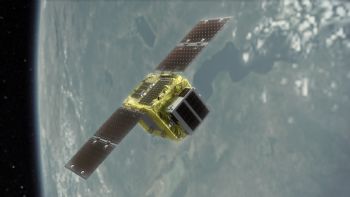
From non-functioning satellites, to fragments as small as a millimetre, the European Space Agency says there’s more than 8,000 tonnes of debris in space.
As the near-orbit of Earth becomes more crowded, the likelihood of satellite collisions is increasing.
Even tiny debris can cause catastrophic damage to functioning satellites, as fragments may be travelling at speeds of 28,000km/hr.
We rely on satellites every day, from hearing the latest news, to using GPS to navigate, so it is important that they keep functioning. The smooth operation of satellites is being threatened.
By 2025, more than 1,100 satellites are expected to be launched per year, more than three times the number launched in 2018, crowding the Earth’s orbit and increasing the likelihood of collisions.
Collisions cause debris, which then increases the chances of further collisions, and so on.
In the future, there could be so much debris that it could cause an uncontrollable domino effect of satellites colliding, in a phenomenon known as Kessler Syndrome.
This could effectively stop satellites operating at certain orbits for decades, with long-term implications for the many services for which satellites are essential.
A company that is part of the Harwell Space Cluster is hoping to reduce the risk of this scenario.
Japanese headquartered company Astroscale has been awarded a grant of up to $4.5 million to commercialise the removal of debris from space.
The start-up, founded in 2013, was awarded the grant from the Tokyo Metropolitan Government to commercialise active debris removal (ADR) services.
Astroscale has also recently been selected as a commercial partner for Phase I in the Japanese Exploration Agency’s (JAXA) first ever debris-removal project.
John Auburn, Astroscale UK chief commercial offer and director, said: “This award confirms our world-leading expertise in Guidance Navigation and Control (GNC) design and algorithms for Active Debris Removal missions.
Astroscale UK will update the National In-Orbit Servicing control centre at the Satellite Applications Catapult to provide the ground control system for this mission.
“With our rapid UK expansion and commissioning of our new building with laboratory and cleanroom at Harwell, this news firmly puts Astroscale on the map.”
This year Astroscale will also launch its first spacecraft retrieval demonstration mission, called ESLA-d (End-of-Life Service by Astroscale demonstration).
It will employ the key technologies in end-of-life and space debris removal. The mission is comprised of a ‘Chaser’ satellite and a ‘Target’ satellite.
The Chaser satellite will use a magnetic mechanism to capture the Target satellite, before steering the two satellites down into the Earth’s atmosphere where they will burn up on re-entry.
ELSA-d will be operated from the National In-Orbit Servicing Control Centre facility which is located at and run by the Satellite Applications Catapult in Harwell.
The centre was developed using a £4 million grant that was awarded to Astroscale through the UK Government’s Industrial Strategy Fund, which supports innovative businesses that address important industrial and societal challenges.
ELSA-d will be the first mission from the centre, but it will also be accessible to companies from all over the country, providing the UK Space Sector with a world-leading facility in space debris removal, in-orbit satellite servicing and other autonomous robotic applications.